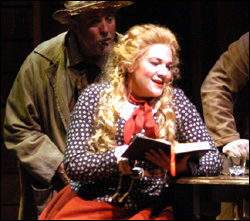Aside from his one-act comedy Gianni Schicchi, The Girl of the Golden West (McCaw Hall; ends Sunday, May 23) is the least manipulative and sadistic of Puccini’s major operas. (It’s also the least frequently staged—that there’s possibly a connection doesn’t say much for the sophistication of opera fans.) The main rap against Puccini as a dramatist is the suffering he foists on his female characters, but unlike Manon, Mimi, Butterfly, Tosca, or Liu, Girl‘s Minnie doesn’t die—and she gets her man to boot.
Minnie runs a saloon in a gold rush mining camp, and when the bandit Ramerrez recrosses her path after a brief flirtation some years earlier, she’s compelled to protect him from Sheriff Jack Rance, one of opera’s most seductive villains. Andrea Gruber is strong and likable as Seattle Opera’s diva in gingham, if only intermittently convincing as a simple pioneer girl. She shares sufficient chemistry with Richard Margison, impressively firm-voiced yet otherwise charisma-free as Ramerrez—though probably any tenor this side of Domingo would come off lacking next to Greer Grimsley, who smolders in head-to-toe black leather as Rance. Grimsley’s dark, winter-weight baritone is a bit gravelly, but in a very good way indeed.
Until this triangle gets going, however, Puccini sets the scene masterfully with a series of episodes, little sepia-toned snapshots beautifully handled by a cast full of top-notch character singers who take their bit parts and run with them. One miner sings a nostalgic song about home; another cracks from the isolation (his comrades take up a collection to send him back East); a cheater at cards gets a little frontier justice; Minnie reads to everyone from the Bible, and later dances with Ramerrez as the smitten miners hum a waltz. Her kindness pays off in Act III, when the roughnecks are about to lynch her lover; she reminds them of all she’s done for them, and they fold like a card table.
It’s all corn, but corn distilled into the purest and headiest bourbon. Grafting Italian operatic conventions onto the mythic American West sounds like a recipe for high camp, but Puccini knew what he was doing. The raw realities of frontier life—love, jealousy, revenge, greed, a brutal code of honor—are Italian opera, and the unsubtle emotional excesses of the form fit better here, in fact, than they do some of Puccini’s other milieus, say turn-of-the-20th-century Japan or the Left Bank of Paris. (Even a hundred years later, operas set in the Old West are a regrettably untapped vein. A musical version of The Searchers—how have composers been so blind as to overlook it?) The one aspect of Girl that may leave a sour taste is its (admittedly brief) portrayal of Native Americans: Director Bernard Uzan doesn’t work terribly hard to rethink or downplay the stereotypes of Minnie’s servant Wowkle (or as Italians pronounce it, “vuff-kleh”), a “squaw” straight off the Land O’Lakes butter box, and Billy Jackrabbit, the father of her “papoose”—a wince-worthy term Puccini may have used, but which didn’t need to pop up in the supertitles.
R. Keith Brumley’s sets are gorgeous, but Seattle Opera has barely used its digital rear-screen projection system since Parsifal last summer, and I was hoping we’d get some cinematic High Sierra vistas. The Seattle Symphony gives its all to the striking score, though, and conductor Oleg Caetani has paced and colored it all wonderfully. Is it just me, or is a stageful of weeping buckskin-clad miners—an adorable and sentimental bunch about as threatening as the pirates of Penzance—more affecting than the torments of all Puccini’s heroines put together?







